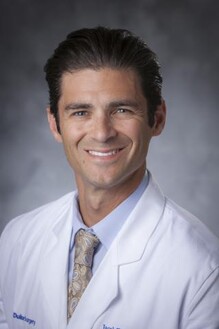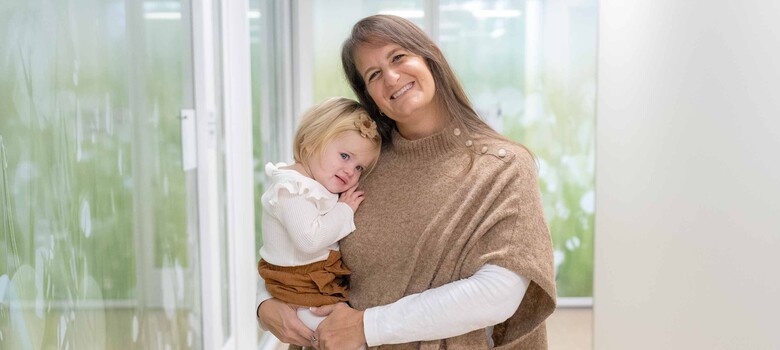Back on the Tennis Court Weeks After Surgery for Esophageal Cancer

When avid tennis player Joseph Mesiano, 73, was diagnosed with esophageal cancer, he got an appointment at Duke Cancer Center Raleigh right away. Three years after completing treatment, he’s back to his old activities, and then some. “Duke saved my life,” he said.
Getting an Appointment at Duke for An Urgent Situation
In 2015, Joseph Mesiano was diagnosed with Barrett’s esophagus, a condition in which the lining of the tube that carries food from your mouth to your stomach thickens and reddens. For six years, he underwent follow-up appointments and regular biopsies. Three days after his 70th birthday, the North Raleigh resident learned that his biopsies showed signs of cancer.
Mesiano’s referral was sent to a local cancer center, but Mesiano grew frustrated and worried when days went by without any word. Eventually, his wife Jeanne said, “I’ve had it. Here’s Duke’s number -- give them a call right now.”
Mesiano called Duke and spoke to a nurse navigator. Within hours, she set up appointments for scans and to meet with a Duke Health medical oncologist as well as thoracic surgeon Jacob A. Klapper, MD.
“When there is a suspicion that you have cancer, you feel an urgency to be seen and taken care of,” said Dr. Klapper. “We can match that urgency.”
Hope Comes in the Form of Surgery for Esophageal Cancer
The diagnosis was confirmed, and Mesiano met with Dr. Klapper. At first, Mesiano said, he didn’t like Dr. Klapper because “he’s telling me something I don't want to hear. But then he says to me, ’90% of the people with this diagnosis I can't talk to.' I said, ‘Why not?' He said, ‘They're too far gone for surgery. You, I can save.'"
“Esophageal cancer is a very concerning diagnosis. It can be a very deadly cancer,” explained Dr. Klapper. “Usually it's discovered quite late, and most patients, unlike Joe, are not surgical candidates.”
Before undergoing surgery, Mesiano started chemotherapy and radiation in August 2021 and tolerated the treatments well. He continued to play tennis -- the best he had played since he was a kid -- almost daily until October. “Then I hit a wall. I get severe dehydration and was in the hospital for a week. They found out it was a fungus on my throat, which is very common. They give me an antibiotic; boom, I'm back playing tennis again,” he said.
In December, Dr. Klapper performed a robotic esophagectomy that removed most of Mesiano’s esophagus. Then to recreate the esophagus, Dr. Klapper turned Mesiano’s stomach into a kind of tube and brought it up to connect to what was left of his esophagus. “That restores continuity of the GI tract, so Joe can eat again,” explained Dr. Klapper.
Hear more from Joseph Mesiano.
“You’ll be back on a court in February.”
In the days following the surgery, Mesiano was tired, but his doctors encouraged him to get up and start moving, first by walking laps around the nurses’ station. “Dr. Klapper would get on my case,” Mesiano recalled. “He was always saying, ‘Hey, you told me you were a world-class athlete. I expect you to do 10 laps.’ He's the one who really got me going.” As Christmas time neared, Mesiano still didn’t feel like his old self. He questioned whether he would ever play tennis again. Dr. Klapper told him, “You'll be back on a court in February.” Mesiano was discharged in January. In February, he played doubles with friends.
“I'm thrilled by Joe's success,” said Dr. Klapper. “I'm thrilled to know that he's enjoying his life.” That life now includes volunteering at the infusion center at Duke Cancer Center Raleigh. Mesiano recalls sitting next to a woman there one day who said to him, "'Joe, I don't even know how to pronounce these two cancers that I got.' I said, ‘This place is going to make you better.’”
Mesiano has passed the two-year mark since his diagnosis, and the chances of his cancer returning are slim to none. He still can’t believe he went through all his testing and met with his Duke doctors before hearing from the first center. Whenever someone asks him about the care he received at Duke, he’s quick respond: “Go to Duke. You got to go to Duke.”



